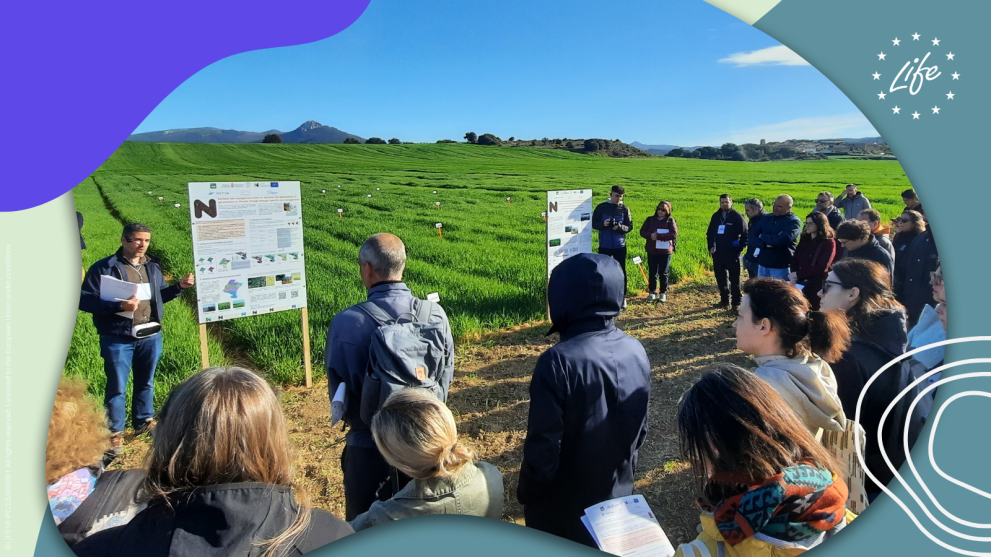
The LIFE Platform Meeting on Soils - held in Pamplona, Spain on 10-11 April - took place against a rapidly evolving legislative and policy context, including the EU Soil Strategy for 2030, and the EU Proposal for Directive on Soil Monitoring and the Carbon Removal Certification Framework (CRCF Regulation), both of which are in the middle of the legislative process.
The meeting was co-organised by CINEA, LIFE NAdapta-CC and LIFE IP Urban Klima 2050. The two projects, with a combined budget of more than EUR 35 million, work across the Navarre and Basque regions of northern Spain with a focus on climate resilience.
Experts and stakeholders from 45 LIFE projects and five Horizon Europe projects gathered for two days to share knowledge and insights on soil conservation, contamination and management. Participants included one Interreg office, the EU CAP (Common Agricultural Policy) network, regional governments and research centres, as well as LIFE DESERT-ADAPT, LIFE CO2SAND and LIFE FRAC-IN.
Day One saw policy updates from the Commission (Directorates General for Environment, for Climate Action and Agriculture and Rural Development) covering the forthcoming Soil Monitoring and Resilience Law, the Carbon Removal Certification Framework and the EU Soil Mission. This was followed by presentations on regional soil strategies as well as the role of the EU Soil Observatory.
Afternoon sessions focused on three working group discussions on soil and agriculture, soil remediation and carbon removals - the results of which were then successfully presented in a plenary session.
The second day was devoted to field visits to LIFE IP-Urban Klima 2050 and LIFE-IP NAdapta-CC projects, both due to run until 2025. Here, participants were shown specific examples of innovative practices such as the management of vulnerable agricultural soils and the remediation of contaminated soils.
The tour started in the Navarre town of Oloriz, where delegates were shown soil resilience trials by LIFE-NAdapta-CC using organic fertilisers and soil management strategies. They then moved on to the Basque country, where they were shown round a former industrial heritage site in Asparrena, located next to the Aizkorri-Aratz Nature Reserve and Natura 2000 area.
The project, run by LIFE Urban Klima 2050, shows what can be done when even a small town - the population is only 1,600 - embraces climate adaptation. In collaboration with the Basque Government, the residents have taken responsibility for cleaning up and managing the industrial ruins.
Finally, the participants visited the Mendebaldea industrial restoration site in Vitoria-Gasteiz, also run by LIFE Urban Klima 2050, which involves rewilding an area round an industrial estate - in part by restoring the soil using experimental phytoremediation techniques. The recovery process improves the quality of soil and plants to create a green corridor connecting the industrial estate with nearby natural rural areas.
Also highlighting their achievements at the conference were LIFE DESERT-ADAPT, LIFE CO2SAND and LIFE FRAC-IN. These three LIFE projects all aim - in very different ways and very different environments - to show that improving soil health and quality can contribute to climate resilience and adaptation.
The host project website includes the detailed programme and presentations. For more information:
-
Video and article by LIFE Urban Klima 2050
The LIFE Platform Meeting on Soils - and the projects showcased there - support a number of EU policies and legislations including the , EU Biodiversity Strategy, EU Strategy on adaptation to climate change, European Green Deal, EU Soil Strategy for 2030, the EU Directive on Soil Monitoring the EU Regulation on the certification of permanent carbon removals, carbon farming and carbon storage in products and the revised Regulation on land, land use change and forestry (LULUCF).
Details
- Publication date
- 2 May 2024
- Author
- European Climate, Infrastructure and Environment Executive Agency

